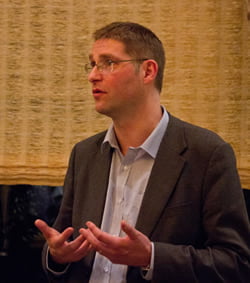
Photo by John Caufield
Magnus MacFarlane-Barrow is the founder of Mary’s Meals, a program that feeds children one good meal a day at their place of education in some of the world’s poorest countries. Here he talks about his program Sept. 23 at Church of the Nativity in Leawood.
by John Heuertz
Special to The Leaven
LEAWOOD — For perhaps 175 years, intrepid Scotsmen have gone to Africa to help feed, map, doctor, educate and Christianize it.
Magnus MacFarlane-Barrow is the latest in this long, distinguished line — but he is undoubtedly the first to be inspired by the alleged appearances of the Blessed Virgin Mary at Medjugorje.
MacFarlane-Barrow is the founder of Mary’s Meals, a program that feeds children one good meal a day at their place of education in some of the world’s poorest countries.
He spoke Sept. 23 at Church of the Nativity in Leawood and later at a reception hosted by Nativity parishioners Michael and Kay Shirley.
The seed of service was sown early in the Scotsman. He was only 10 when his sister learned that the Blessed Virgin Mary was reported to be appearing to teenage kids in Bosnia, at a place called Medjugorje.
A party of 10 young people — his sister was the oldest; he, the youngest — went to see what was going on and came back changed people.
So it seemed kind of natural when, in his early 20s, he and his brother Fergus decided to take a truckload of blankets to Bosnia, where civil war was raging.
His simple request for blankets generated an avalanche of donations, and eventually Magnus MacFarlane-Barrow decided to quit his job and devote himself to helping the poor full time.
In 2002, a terrible famine struck Malawi, a landlocked, pro-Western southeast African nation a little over half the size of Kansas that is one of the least developed countries in the world.
Its per capita income is just $322. The cities, already full of poor people, were now bursting with desperate, starving refugees. People were so hungry they were eating the leaves off the trees, because it was all they had.
MacFarlane-Barrow headed there to help and met Emma, a Malawian dying of AIDS.
With only some three weeks to live, Emma’s primary concern was not herself, but what would become of her six children after she was gone.
Visiting with Emma’s eldest, 14-year-old Edward, MacFarlane-Barrow learned that Edward’s goals in life were very simple: He wanted enough to eat and to go to school someday.
Struck by the modesty of Edward’s goals, MacFarlane-Barrow started feeding 200 children at one school in Malawi that very year.
And “Mary’s Meals” was born.
This modest beginning has now blossomed into feeding about 577,000 children in 16 nations on four continents every day.
These children range from former child soldiers in Liberia, to “untouchable” children in India who live and eat in huge, festering city dumps, to semi-nomads in Somalia and northern Kenya whose folkways are not far removed from the Stone Age.
Mary’s Meals feeds them all . . . and many others besides.
“It’s Our Lady’s work. Pray that we do it the way she wants it done,” said MacFarlane-Barrow.”
Apart from its heavenly patronage, there’s also an important this-world component to Mary’s Meals’ astounding growth.
“I always tell [the people we help] it will work only if the village takes ownership of it,” he said.
“Mary’s Meals is not about helpless people waiting passively for someone to help them,” he continued. “It’s about people walking together to do this beautiful work.”
In Malawi alone, over 60,000 people get up every day at first light to cook and distribute the children’s “Likuni phala.”
Likuni is the town where this highly nutritious blend of corn, soybeans, vitamins, minerals and sugar was first developed. “Phala” means “porridge.”
Likuni phala might be the most cost-effective food anywhere. Mary’s Meals can feed one nutritious meal a day for as little as $10 per child per year.
Mary’s Meals is now racing against the clock to get food into Somalia — a country where the United Nations estimates four million people now face starvation, and 750,000 face imminent starvation. It’s also one of the most dangerous places in the world today.
When asked why he gave up a safe and secure future as a salmon farmer — MacFarlane-Barrow and his wife Julia recently welcomed their seventh child — he paused a moment before answering.
“It just kind of happened. It’s not like I sat down and made a plan,” he finally said.
“I wish to love God by serving his poor,” he said.
To learn more about feeding a child this one nutritious meal a day, go to the website at: http://www.marysmeals usa.org. To donate, click on the “Donations” link and choose “KC Heartland.”






